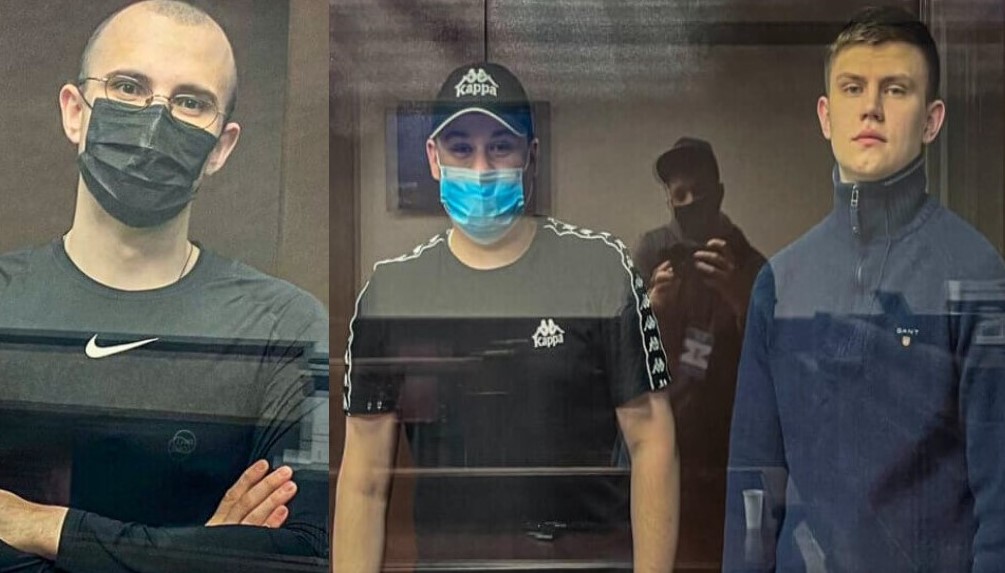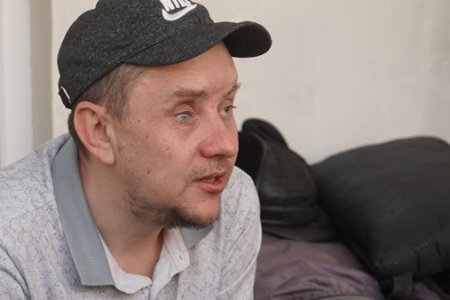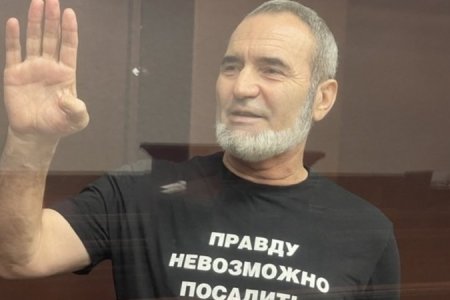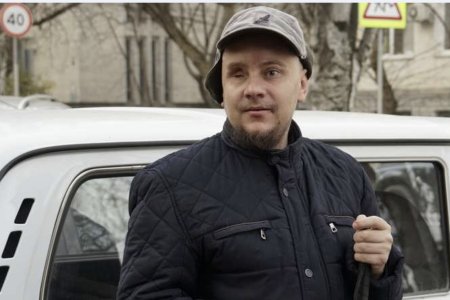
Russia’s Southern District Military Court has sentenced four Ukrainians from occupied Crimea to terms of imprisonment for supposed plans to commit an act of terrorism. Scepticism regarding the charges seems particularly warranted given the reported role played by an individual used by Russia’s FSB for its political trial of Ukrainian filmmaker Oleh Sentsov and three other Ukrainians.
Andriy Kuliievych; Mykola Lahutin; Valentyn Khoroshaiev and Danylo Reshetnichenko were sentenced by the same Southern District Military Court in Rostov-on-Don which has been notorious, since the horrific sentences passed against Sentsov and civic activist Oleksandr Kolchenko, for politically motivated trials of Crimean Tatar and other Ukrainian political prisoners. The men were all accused of having planned to carry out an explosion at a Simferopol market in 2020 and to have made ‘calls to overthrow the state system of the Russian Federation’. The only ‘evidence’ for these charges would appear to have been explosive devices; three bullets and leaflets which the FSB claimed to have found during ‘searches’ carried out without lawyers present.
It was Graty journalists Anton Naumliuk and Sofia Rostova who first highlighted the reasons for concern about this case back in May 2022. Five young men had been detained in June 2020 with the Russian FSB claiming that they were suspected of planning an explosion at a wholesale marked in Simferopol. Only the above-mentioned four Ukrainians were charged, with the case passed to the Southern District Military Court a year after the young men’s arrest. Graty pointed out that the arrests had been made and the charges laid after a denunciation about the leaflets from Oleksandr Pirogov. This individual, described back in 2014-15 as a chemistry student, played a major role in the prosecution of Oleh Sentsov; Oleksandr Kolchenko; Hennady Afanasiev and Oleksiy Chyrniy. It was Pirogov who claimed that Chyrniy, under the leadership of Sentsov, was planning to cause explosions in Simferopol; who illicitly taped Chyrniy on equipment provided by the FSB and who also passed Chyrniy an FSB-produced fake bomb. Although the FSB claimed that all four men, including Chyrniy, were members of a ‘Right Sector saboteur group’ who were planning major attacks, the only actual evidence was of very minor acts of protest against the Russian invaders. Chyrniy, one of two men who gave ‘confessions’ under torture (and the only one who did not later retract it), was found guilty of planning explosions on Victory Day (9 May) near the Eternal Flame and at a monument to Vladimir Lenin.
There are many ominous similarities in the FSB’s arrests on 10 June 2020, including the grandiose claims made by the FSB and circulated in Russian state and Russian-controlled media. A video showed armed FSB and other officers breaking down doors, bursting into several homes and making arrests. The videos showed a pistol with bullets; a home-made explosive device and detonator; and leaflets with a text calling on people to “overturn the current criminal Russian regime at any price.” All of this was supposed to have been uncovered during the ‘searches’.
Back in May 2022, Graty reported that the four men - Kuliievych, Lahutin; Khoroshaievand Reshetnichenko - were charged with planning a terrorist attack at the Simferopol market (Articles 205 § 2a and 30 § 1 of Russia’s criminal code); and that Kuliievych, Lahutin and Khoroshaievwere also accused of unlawful procurement, possession, etc. of explosives (Article 222.1 § 2); of ‘circulating public calls on the Internet to carry out terrorist activities’ (Article 205.2 § 1). Danylo Reshetnichenko was accused of the ‘public calls’ charge, under Article 205.2 § 1). Judging by his much lighter sentence, only the last charge was eventually laid.
The FSB has a long track record for claiming to have thwarted planned attacks, with this backed by very questionable evidence. Judging by Russian state media reports, citing the FSB, the charges were also alleged to have been proven because the detained men had “links with radical nationalist formations’ fighting in Donbas.
The young men all denied the charges, however three of the four were immediately placed, and remain, in detention. Only Reshetnichenko was initially placed under house arrest, and then released from that on a signed undertaking not to abscond.
The presiding judge Alexei Magomadov has already been involved in political trials of Ukrainian citizens, including the appalling sentence against Oleh Prykhodko. The latter’s conviction was also based on provably fabricated charges and on explosives supposedly found in one of Prykhodko’s two garages, with the FSB not even bothering to open the second garage.
The state prosecutor, Sergei Aidinov, regularly represents the prosecution in political trials of Crimean Tatar civic activists and journalists.
There were two main prosecution witnesses – Vladimir Lisetsky and Oleksandr Pirogov. The role of both of them essentially boiled down to denouncing the men in connection with the alleged leaflets. Graty reports that it was after Pirogov approached the FSB that criminal proceedings were initiated.
There were also, as is always the case in such dubious prosecutions, ‘secret witnesses’, whose testimony cannot be verified, and who may not have ever known the defendants. In fact, the ‘testimony’ from the first of these ‘witnesses’, really only claimed that the young defendants had openly opposed Russia’s annexation of Crimea and Russian leader Vladimir Putin in a social media chat group.
Lahutin was in contact with Graty and told the journalists and he and his family had been held in the kitchen during the so-called ‘search’ during which the FSB claimed to have found explosives and the leaflets. He is adamant that all such items were planted by the FSB.
According to the court, the ‘investigators’ had established that “in order to carry out an explosion in a place where there were a lot of people, Kuliievych, Lahutin and Khoroshaievhad, in 2020 carried out a search of potential locations; had undertaken reconnaissance work on anti-terrorist security systems at these locations by examining and photographing them, and had also prepared three explosive devices and illegally kept them at their homes.” They had allegedly been stopped from carrying out this “criminal plan” because they were arrested.
Magomadov and the other judges ignored the many questionable aspects of the charges, the obvious difficulties experienced by the supposed secret witnesses in answering questions from the defence, etc. On 20 June 2023, all four men were convicted of the charges against them. Kuliievych was sentenced to 7.5 years in a harsh-regime prison colony, with the first four years in a prison, the harshest of all Russian penal institutions. He was also fined 250 thousand roubles. The sentences against Khoroshaiev and Lahutin were for the same amount of time in a prison and the same fine, however Khoroshaiev was sentenced to 7 years and 3 months; Lahutin – 7 years. Reshetnichenko was sentenced to two years in a low security prison colony.
The sentences will almost certainly be appealed.



